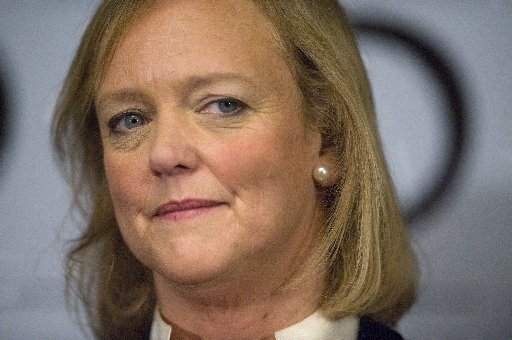Last week I had a chance to sit down with Gubernatorial hopeful Meg Whitman for the better part of an hour. Our interview covered a number of policy areas including global warming/AB32, eminent  domain, gun control, abortion, and philosophy about government. Because we had the handy FlashReport digital recorder along, we’ll be able to bring you some direct excerpts from the interview. Because of the location at which we met in Menlo Park on the San Francisco Peninsula,
domain, gun control, abortion, and philosophy about government. Because we had the handy FlashReport digital recorder along, we’ll be able to bring you some direct excerpts from the interview. Because of the location at which we met in Menlo Park on the San Francisco Peninsula, we’ll call these "Excerpts From The Peet’s Coffee Interview" — and here is a segment where we discuss the environment, global warming, and the implementation of AB32, California’s legislation that requires strict reductions in greenhouse gas emissions of all sorts… Enjoy! Flash.
we’ll call these "Excerpts From The Peet’s Coffee Interview" — and here is a segment where we discuss the environment, global warming, and the implementation of AB32, California’s legislation that requires strict reductions in greenhouse gas emissions of all sorts… Enjoy! Flash.
Flash: Let’s talk about greenhouse gas emissions and the science behind global warming, and what your philosophy is about global warming. And then let’s have a talk about what you think should or shouldn’t be done about it on the short term versus the long term.
Whitman: So I think the science is fairly compelling behind global warming. Nothing is iron-clad in science, but as I look at the data, it does look to me that the earth is warming. It started largely around the Industrial Revolution and it has gone pretty dramatically up over the last 110, 120 years. And you look at some of the obvious statistics around the size of the polar ice caps and things, it does look to me like the earth is warming. I would also make the conclusion that actually man does have a hand in this. There may also be long-term cycles to me, but I would say it does, to me, looks like the data says that man has had a hand in this.
And therefore, I say, “Okay. Let’s assume that’s true. But there’s other reasons to try to reduce our dependence on foreign oil. There’s other reasons to reduce greenhouse gas emissions”. And my view is, so, guess what, actually? Whether you are an environmentalist or whether you are interested in foreign policy, there’s a reason to get off fossil fuels. I am, in fact, deeply connected to making our environment better. What has happened here is that we have lost balance. And you know, in life, balance is everything. And we have lost the balance between protecting the environment and protecting people and jobs.
And as I said in speech at the convention in Indian Wells, we can not lose sight of people and jobs because California needs them both. So my view on AB32 is while it has laudable goals, there’s a flaw, and the flaw is we are rushing to implementation here in a time where we have the highest unemployment rate we’ve had in a long time, where e are absolutely placing California at an economic disadvantage to Oregon, Colorado, Utah, Nevada.
I think of Oregon as a pretty environmentally progressive state. They don’t have this regulation. And I have talked to so may businesses that say, “Gosh, if I have to comply with these regulations, I have to look again really hard at expanding in Nevada or Utah or Arizona or Colorado”. So I think while a laudable objective, the unintended consequences, for people and jobs was not well thought out, and I don’t think we can rush to judgment here, rush to implementation until we fully understand what’s going on here. And fundamentally, being at a competitive disadvantage to our neighboring states has not stood us in good stead. It has not.
INTERMISSION: This is a good point to thank Meg for my hot chocolate with whipped cream. As we ordered, she ordered her coffee "Vente" then turned to me and pondered aloud if it annoys the people at Peet’s when people like her say "Vente" — which in Starbuck’s speak is a large.
OK, Back to the interview…
Whitman: I would come back to innovation as the solution here. If the electric car guys can get a car that runs efficiently on electric that is as cost effective to drive as your gas-powered vehicle, you might switch. I actually drive a Ford Escape hybrid. This is the greatest thing for me. It’s a great car. It saves money on gas and it’s not emitting as much greenhouse gases. How great is that? …my view is that’s where innovation comes in, to the extent that wind and solar and bio fuels and electric cars become cost-effective, then great.
Flash: So the biggest challenge on that argument is that we will find that, over time, it’s going to be the Third World countries or the countries that don’t have the money or the technology to be able to change the way to do business that are going to end up being the big polluters.
Whitman: Well, that’s why – the argument can be made, the reason why actually requiring greenhouse gas emissions in California down to a very low level puts us at a competitive disadvantage to the neighboring states? You scale that up, and if we put that at the national level, it puts us theoretically at a disadvantage to India and China. So I understand that line of argument. I do understand that line of argument, although I would say we just need to be thoughtful of the leadership role that we may want to play in the world.
But I’m with you, Jon. I think we need small, efficient government that doesn’t overreach into people’s lives, into businesses’ lives. I absolutely subscribe to this theory. I’m a big believer in innovation. Trust me. These car companies that are doing these electric cars, they have every incentive to get this right. They have every incentive to figure out how to advance the battery power technology to make it incredibly effective and cost-effective. They have every incentive to make the cars fun and interesting to drive, because if they can actually beat out the gas-powered cars, these guys would make a lot of money.
Next we’ll feature our conversation with Whitman about the issue of eminent domain…
Care to read comments, or make your own about today’s Daily Commentary?
Just click here to go to the FR Weblog, where this Commentary has its own blog post, and where you can read and make comments.

